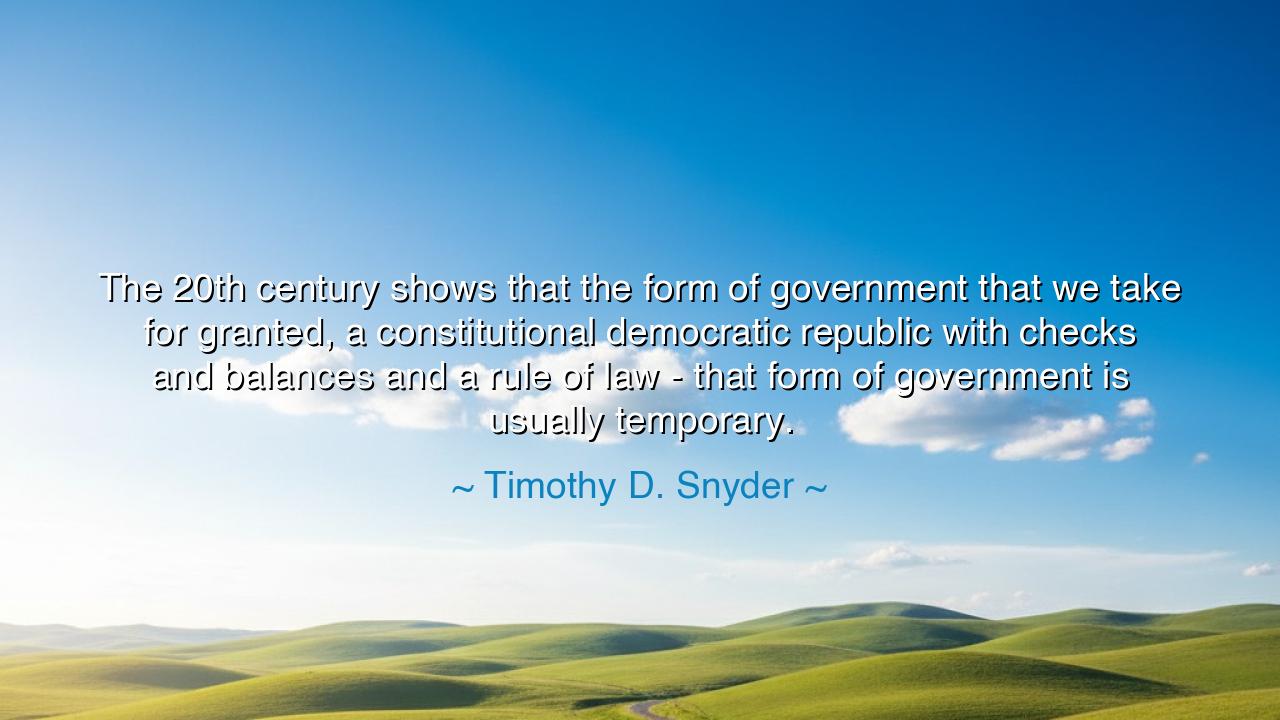
The 20th century shows that the form of government that we take
The 20th century shows that the form of government that we take for granted, a constitutional democratic republic with checks and balances and a rule of law - that form of government is usually temporary.






When Timothy D. Snyder said, “The 20th century shows that the form of government that we take for granted, a constitutional democratic republic with checks and balances and a rule of law — that form of government is usually temporary,” he was not issuing a prophecy of doom, but a warning drawn from the blood-soaked pages of history. His words cut to the heart of modern complacency. We, the inheritors of liberty, often imagine that democracy and the rule of law are permanent fixtures of civilization — unshakable pillars of progress. Yet Snyder, a historian of tyranny and totalitarianism, reminds us that such faith is fragile. The 20th century, that age of both enlightenment and horror, revealed that freedom’s endurance is not natural — it must be defended, renewed, and re-earned with every generation.
The origin of this quote comes from Snyder’s deep study of European history, particularly his works On Tyranny and The Road to Unfreedom. Having examined the rise and collapse of democratic institutions before the emergence of totalitarian regimes like Nazi Germany and Stalin’s Soviet Union, Snyder witnessed a sobering pattern: constitutional governments often perish not from invasion, but from internal decay. Citizens, lulled by comfort or distracted by ideology, surrender vigilance; leaders, hungry for control, erode the rule of law bit by bit; and soon, the framework of democracy — once strong and proud — collapses like a house of cards. What was once “taken for granted” becomes a memory whispered among the ruins.
In the style of the ancients, Snyder’s message might be likened to that of a prophet standing before a fading empire, crying, “Do not mistake comfort for security, nor longevity for immortality.” His warning echoes the ancient Greek historian Thucydides, who chronicled how Athens — the first democracy — fell not because of external conquest, but because of corruption within. Power bred arrogance, arrogance bred division, and division led to ruin. Likewise, the Roman Republic, that mighty model of civic virtue, gave way to dictatorship when its citizens traded responsibility for spectacle, law for loyalty, and principle for power. In every age, the same truth repeats: freedom without vigilance withers; law without conscience collapses.
Consider the story of Weimar Germany, a republic born in the aftermath of the First World War — free, hopeful, and democratic. It had a constitution admired by scholars, a parliament elected by the people, and leaders chosen through law. Yet within two decades, that republic was gone, replaced by a regime of terror. The people did not wake one morning to find themselves enslaved — it happened gradually. Laws were bent in the name of “emergency.” Courts turned silent. The press grew timid. Citizens accepted each erosion as a necessary evil. And when at last the constitution was ash, it was too late. Snyder’s words remind us: democracy dies not in fire, but in the slow cooling of the people’s courage.
The emotional power of his statement lies in its humility. He does not say democracy is doomed — he says it is temporary unless we act. It is not a monument carved in stone, but a garden that requires tending. The weeds of apathy, cynicism, and blind allegiance grow quickly. Every generation that inherits liberty must decide whether to care for it or let it rot beneath the weight of neglect. Checks and balances are not just institutional devices — they are moral disciplines. They demand that leaders restrain themselves, that citizens question authority, and that truth be valued above comfort. Without these virtues, law becomes an ornament, and power becomes absolute.
Snyder’s wisdom, then, is both historical and prophetic. He invites us to remember that the tragedies of the past were not inevitable — they were the result of choices. People abandoned truth for ideology, justice for convenience, and freedom for security. His call is for conscious citizenship: to participate, to think critically, to defend the independence of courts, the honesty of journalism, and the sanctity of law. He warns that tyranny does not always announce itself with marching boots; sometimes it arrives in the language of patriotism, efficiency, or fear.
The lesson of this quote, passed down like a torch to the next generation, is clear: democracy is not a gift — it is a task. It demands guardianship, courage, and memory. Every time we speak truth, challenge injustice, or defend the weak, we strengthen the fragile threads that hold liberty together. But every time we shrug in indifference or yield to cynicism, those threads fray. The rule of law, the balance of power, the voice of the people — these are not eternal blessings; they are living commitments.
So let Snyder’s warning echo through the corridors of our age: freedom endures only as long as we choose to defend it. No constitution, no court, no government can preserve what its people cease to love. If the 20th century showed us the fragility of democracy, let the 21st prove its resilience — through courage, wisdom, and action. For the form of government we take for granted is not promised by time or fate; it is preserved only by the strength of the human spirit — the eternal will to remain free.






AAdministratorAdministrator
Welcome, honored guests. Please leave a comment, we will respond soon